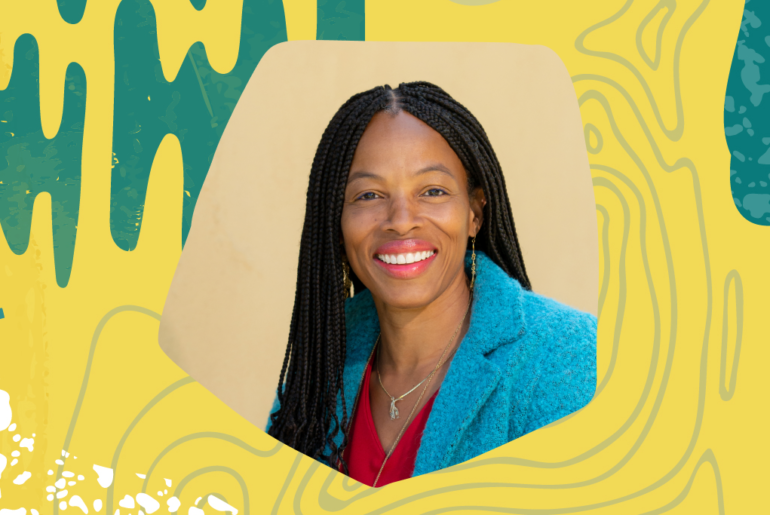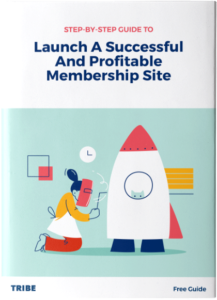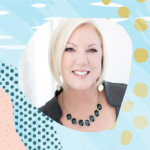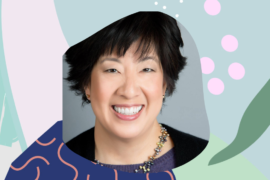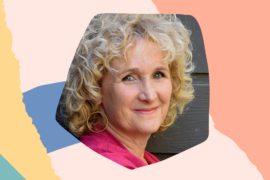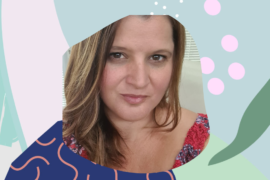When the stress of being in work and school full-time took over, Lauryn Bryght wasn’t able to make nutrition or fitness a priority. After being told she had high blood pressure and that she’d need to take medication for the rest of her life, she changed her diet and soon lost 97 pounds.
Now, at The Food Boss Academy, Lauryn teaches people what they need to do to reduce their A1C level to prevent the onset of type 2 diabetes, even if it runs in their family. She provides her community with access to much-needed coaching, accountability, inspiration, and education.
Today, Lauryn joins the podcast to share the story of her own food and nutrition journey, how she’s using her membership to help people just like her, and the beauty of helping people make meaningful, lasting changes.
Key Takeaways
- Lauryn’s strategies for teaching people to change their mindset gradually–not overnight.
- How Lauryn’s membership became an outlet for other things she loves to do.
- Why the biggest win for Lauryn is simply hearing that her clients have lost weight or prevented the onset of diabetes.
Free Give
FREE Guide – Launch & Grow a Profitable Membership Site
Ready to reclaim your time and attract more monthly paying customers? Our step-by-step guide will show you how to build a membership site that turns your passion into recurring profit. Click here to download!
Memorable Quote
- “Baby steps. Small wins. Because changing our mindset is not something that happens overnight.” – Lauryn Bryght
Episode Resources
Transcript
Read The TranscriptShelli Varela: Lauryn Bryght, welcome to the It’s a TRIBE Thing Podcast. Buddy, I’m so excited. How are you?
Lauryn Bryght: Hey, Shelli. I’m doing great. Thank you so much. Glad to be here. Appreciate it.
Shelli Varela: I love our pre-talk for a number of reasons. So, I’m really excited to share your story for you to tell us where you come from and how you got to the amazing position you’re in. But if we can start with what do you do and who do you serve?
Lauryn Bryght: Cool. Thank you. So, I have a membership site, membership group, membership, class, family, whatever you want to call it. And what I do is I teach people the tools that they need to reduce their A1C level so they can prevent the onset of type 2 diabetes even if it runs in their family.
Shelli Varela: Amazing. For those of us who don’t know, what is an A1C level?
Lauryn Bryght: So, it’s a way to measure the amount of sugar in one’s blood so that, again, it’s a precursor to type 2 diabetes. And I do it with food and not medication.
Shelli Varela: So important if you’re able to manage it with food for sure. So, your story is really interesting. I know that you lost a number of pounds and we were talking about things like self-identity and how do you get to be from a fit person to put weight on to take it off and keep it off. So, would you mind taking us all the way back to the beginning of the story and share with us how did you earn the right to teach these people all the amazing things you’re teaching them and the results that you’re helping them achieve?
Lauryn Bryght: Right on. Thank you. So, you know, as a baby boomer myself, I really focus on helping that contingent of a population and largely women as well, because, again, that’s me. And it really started, I’ve always been a fit person or not always, but for most of my life certainly growing up very active, swim team, I ran track, I used to ski and scuba dive and just all the things, playing tennis. So, I’m always very active. And at one point in my life, the stress just kind of took over, and managing that I did through food. I was working full-time and going to school full-time to get my MBA and food just wasn’t a priority.
Shelli Varela: I know you had mentioned a conversation or a series of conversations your dad had with you when you were younger about weight and fitness and the importance of that or his thoughts on that in your family. Can you share what that sounded like and what were the messages that you were receiving as a young girl who at the time was fit and swimming and playing tennis and the like?
Lauryn Bryght: Sure. Absolutely. So, my dear beloved daddy, rest his soul, always commented on women who were just walking by the car or down the street if they were large like, “Oh, that’s a big one. Oh, look at that. You know, a little overweight there or a lot of overweight.” And so, the messaging that I received was that’s not good. I’m like, “Well, daddy’s making these negative comments, then that must not be where I want to go.” And of course, as an only child and a daddy’s girl, I’m like, “All right. Well, I better not be overweight.” But the thing is, I always…
Shelli Varela: And at the time you were “good” because you were the epitome of what he thought young girls should look like, be like, act like.
Lauryn Bryght: Yes, 100% and not through any – I was about to say through no restriction. I mean, I do recall having to ask if I could have some ice cream for dessert. We didn’t keep a bunch of junk food in the house, so that was not an issue but there was definitely conversations around let’s just eat what’s appropriate and not overeat.
Shelli Varela: So, then your life takes a turn and you’re going to school and then what happened?
Lauryn Bryght: Yeah. McDonald’s just became my friend. I mean, I was that girl, that single girl, no kids, eating out all the time and not always fast food. You know, sometimes I would go to Whole Foods and get food from the buffet. So, I kind of felt good, like I was eating healthy food, but it was still a lot of high fat, high salt. And they’re going to restaurants maybe and just eating too much, eating too much of the wrong things as I know now because that was also a big part of what my social life was. It was just to go out and hang out and eat some good food.
Shelli Varela: Now, you had talked about how as you started to put some weight on, you were getting attention. And so, here you are this young woman who’s like starting your life and you’re going to school and you got your head down and you’re focusing, but you’re also really stressed and you’re also really busy and subsequently also getting a lot of attention from men. Can you tell me what you were sharing with respect to where you were in that headspace and what you were trying to achieve and how at that time that was detrimental to the goals and dreams that you had?
Lauryn Bryght: Yeah, absolutely. So, shortly after college, a couple of years after college, I was married and I was married for just under a year. I think maybe I made it to eight months. I’m not exactly sure. And I felt like such a failure that I had made the wrong decision. I dated this guy for a couple of years and, again, I was just out of college so I felt smart. You know, I don’t know everything but I felt smart and okay, yes, this is the one for me, married, have a house, a picket fence, the kids, the dog, all the fairytale stuff. And so, when that marriage ended, I felt like a failure and like I don’t know how to make a relationship choice. So, how about I just not make one? And by not making one was making one, but I will keep myself out of the relationship room. And I was still getting a lot of attention from men who want to go out. I was trying dating and that still wasn’t all that great because of my insecurities, 100% will take ownership of that. And so, then I remembered, “Oh yeah, that’s right. Growing up, daddy always said that men don’t like women who are overweight.” So, let me go that route. That’ll be okay. That’ll be one way to kind of calm the waters a little bit so I can keep focusing on work, keep focusing on my education, and getting my master’s degree.
And so, I was just eating McDonald’s all the time but what I found out is that I’m like, “Daddy, you were wrong about that.” So, there are just different kinds of men that there are still men that are okay with women being overweight. So, then I was like, “Dang it. That didn’t work out so well.” So, that combination of that, made a visit to my doctor telling me that I have high blood pressure. I was going to have to be on medication for the rest of my life and seeing a picture of myself as a bridesmaid were the three things that led me to, “We are done with this.” Ninety-seven pounds later, I’m here running a membership to help, again, baby boomers like me who want to reduce their A1C level so that they can prevent the onset of type 2 diabetes even if it runs in their family, and they would rather use healthy food instead of medication for that purpose.
Shelli Varela: Well, you said something really powerful earlier. You said when people say it runs in the family and you said, “Yeah. Unhealthy choices also run in your family.” So, I guess is it nature or nurture in some regards, right?
Lauryn Bryght: Yes, exactly. And listen, I try to be a biology major, so I’m not here saying that there are not some hereditary issues associated with this but I am saying if there are hereditary issues, those habits need to be on point to prevent oneself from contracting the same.
Shelli Varela: I thought it was really powerful. We were talking earlier about a person’s perception of who they believe they are and how if a person perceives themself and believes them to be somebody who is big-boned or heavier, I know oftentimes people can lose the weight and the effort and then they’ll deplete calories and they’ll achieve their goal. But underneath all of that is a person who actually believes that their set point is to be a bigger person. When it comes to stuff like that because I know that you’ve had some incredible success with yourself and have definitely earned the right to talk and teach about this, how do you address that with your community, with your membership people? Because it seems to me like there is the mechanics of it like there is the science of the food and the biology, but also there is the human being who has to go through the journey. What does that look like?
Lauryn Bryght: So, that’s an excellent question. Thank you for that. Baby steps. Small wins. We start with the like, “Can we just get our water in? How about that, guys?” “Oh, I just love pop. I can’t give up my whatever soda.” “Okay. Can you add 4 ounces of water every time you have one of these drinks? Can you add 8 ounces the next day so that we can start to build up some confidence and some successes in small areas?” Because changing our mindset is not something that happens overnight. Don’t ask me how I know.
Shelli Varela: No. I won’t ask you how you know.
Lauryn Bryght: I know.
Shelli Varela: For sure. And do you think if you can help people wrap their mind around perceiving that there are different possibilities that they never considered before for themselves, in your opinion, does that make the doing of the things like the tasky stuff in the water and the things that you actually need to do, move your body, and things like that? Does it make doing those things easier when you believe it’s possible?
Lauryn Bryght: 100% and also, one, I tied to Facebook live on this on my business page, I think it was last Friday within the last couple of weeks about knowing that there’s going to be some difficulty. So, if you know going in there’s going to be that difficult time, you won’t be surprised when it comes and your brain won’t be telling you, “Oh, no, no, no. Danger, danger, danger. Eat a cupcake. Oh, no, no, no, no, no, no, danger, danger, danger.” So, I help people set themselves up for the success and for those speed bumps that are inevitably going to happen. One thing that happens to everybody I’ve ever talked to is they’re sitting down to work on a project and they’re going to concentrate and then all of a sudden, “Oh, I’m hungry. I have to have a snack.” No, you don’t. But your brain needs fuel in order to think. So, from the historic days of the cavemen and cavewomen, your brain is like, “Oh, we’re getting ready to go to work. We need some extra.” You’ve got plenty. You probably just have something to eat an hour ago, so you don’t need that, but just making people aware of these little tricks so it can get a little bit of neuroscience, a little bit of woo in there I teach. Making people aware of that ahead of time helps them realize that some of these habits that they have, have been keeping them from success, not just the food habits, but the thought habits. So, one thing I like to say is I teach people how to eat and think so they can lose weight and keep it off forever.
Shelli Varela: For you, what has been the biggest benefit that you didn’t expect from having lost the weight and kept it off?
Lauryn Bryght: Joy. Just internal joy, satisfaction, a relaxation of my mind, it’s not always spinning. “Oh, should I do this?” or, “Oh, I need to…” or, “Oh look at that.” I mean, I do still obsess about my muffin top. I’m not going to lie. So, I’m like, “What?” But that’s my thing. I don’t want a muffin top, but I still have one and I’m like, “Well maybe I need to just get over that.” So, the joy, just the joy of, “Wow. I did that and I do feel so much better.” And it’s one of those things that I wish I could tell people but it’s something that people have to experience for themselves. And I will be the cheerleader until the death and I am very fortunate that my parents were that for me. I know we’ve talked about my daddy and all his stuff but 100% that man loved me like no tomorrow and my mother the same. So, I know that all the love that they and my grandparents poured into me, I know I give that to my members and to anyone else who will listen. So, it’s the joy of how much easier it is to get in and out of the bed at the lighter weight, in and out of the car. I drive a big pickup truck and so I can climb in and out of that thing on the tire over the side, do this, do whatever. I can’t do that if I’m almost 250 pounds but at almost 150 pounds, I can.
So, it’s that confidence and that’s what keeps me going. It’s like I’m not getting any younger. Duh, obvi. But again, as a baby boomer, I’ll be 57 this year, I’m like, “I got to keep going. I got to be able to do whatever I’m going to do.” I was out weeding my yard this morning. So, that’s the single. That wasn’t just one but it’s the single, if I had to summarize, it would be being physically active as someone who’s almost 60 and being able to do things with ease. Just live my life, going to the grocery store, getting in and out of the car, getting out of bed, like I said.
Shelli Varela: Well, it’s got to be so helpful for your people to have a cheerleader who has successfully done the thing. And I always say, you don’t really want to learn how to run a marathon by reading a book. You want to talk to somebody who has run a marathon and can tell you about hitting the wall. Like you said, there’s going to be times when this is crappy and hard and when you expect that, it’s like, “Oh, I remember Lauryn said this was going to happen, so I’m on the right path still.” And even simple things like they don’t know what they don’t know. They don’t know that they’re tired right now because they’re used to being tired until they get to the other side of that. So, it’s probably very helpful for them to have somebody like you who has been through the journey and knows all of the nuances. I wanted to switch just for a second to talk about creating a membership side. I know you were talking about when you were in school and the stress level and just like, head down, hammer down, and here we go. What has life been like now that you have this membership? And not only do you get to share this incredible gift that you have learned with the people who are now able to take advantage of it but how is having a membership site as opposed to the kind of stressful life you had or a corporate job or whatever that looked like with the freedom that you get having a membership to run?
Lauryn Bryght: Oh, it’s brought me so much joy. It’s so wonderful to be able to do something that I love and help people get the joy that I have. When I was growing up, I didn’t mention this. What I did mention is as an adult, I was eating out a lot. Growing up, we ate out a lot. And certainly, on Sundays going to brunch was a big thing. And so, I used to want to start a restaurant. That was going to be my thing. I’m like I want to open a restaurant. I was going to name it after my grandmother and just all the things. And so, then I was like, “Oh, there’s a lot of work to run a restaurant.” So, I did a bakery. I had like a side hustle bakery for a while and that was great. And now in my membership, I get to teach people how to cook. So, I just love how we do live cooking like we do live meal planning. We do live cooking classes. And so, it’s like having a restaurant. I mean, it’s still that kind of Sunday dinner, everybody get together, get in the kitchen, and cook a meal, except we cook the meals for the week. And how that love of cooking that I have and wanting to serve people in that way has come, I don’t want to say full circle, but certainly has taken to some different turns but I still get to do that. And I’m like, “Wow. This is so cool.”
Shelli Varela: There’s a gift in that I want to give to everybody and if they didn’t pick it up, I’m going to pluck it out and serve it up to everybody. And that is, “Pay attention to what you love without an agenda.” So, for you, if you trace the route all the way back, you have had these experience, you’ve experienced stress, you’ve experienced weight gain, and what that cost you, and weight loss from what you benefited from. You also paid attention to the fact that you love cooking, you love food, you love restaurants, and you’re literally doing something now that encompasses all of those. And if somebody had told you that at the very beginning, but the very beginning of your journey, you probably would have said, “What?” You can make money and have a thriving business just curating all of the things that you love and are passionate about, and the answer is absolutely, yes. So, thank you for that incredible example. What is the best piece of feedback you have received from one of your community members?
Lauryn Bryght: I would say that that they lost weight. Everyone wants to lose weight, even though I’d say that I don’t teach diet, I’m not a diet coach. I’m a diabetes prevention coach. Weight loss is part of that but what people love is that with the recipes and the menus that I provide in the membership, you’re losing weight and the food tastes good. I tell people, “Listen, I didn’t use to weigh almost 250 pounds because I don’t like to eat. I like to eat. I still like to eat. And the food needs to taste good.” So, I’d have to say that’s the biggest thing. The other thing that they’ve said, the one biggest, the one biggest is that they’ve lost weight. Everybody on some level wants to lose weight because of the benefits that it will get them, again, preventing the type 2 diabetes with managing their A1C level. And the other one is that they don’t have to think about what they’re going to eat. I do all the thinking and heavy lifting and here’s the grocery list and all the things for them. Obviously, they need to get on their own. At some point, they will but we’re talking about where people are in their particular journey. For my people that are farther along the journey then the mindset, the habits, is where they are able to take a benefit. It’s like, “Oh, okay. So, you’re saying that every day at a certain time I should plan to do X, Y, Z, write in my journal, plan my meals, whatever?”
I’m saying, “Yes, absolutely. Every day while you’re brushing your teeth, you should decide to have your 8 ounces, yes, if you’re just starting out.” But for my longer-term people, it’s when they’re making decisions about eating something that’s not on their plan, not on their protocol, they are benefiting by knowing that they’re okay. Like, what is the language? Like, for example, on the call last night, I’m talking to one of the gals and she’s right now really busy, got a lot of things going on, and she’s like, “Oh, I’ve completely fallen off. I haven’t done anything. I’ve messed up everything.” La la la la la la. She’s going on and on and on. I’m like, “Okay. Let’s come back to this. I’ve messed up everything. Is that true? Is that really true?” So, tell me about that. “Well, I didn’t have my 64 ounces of water, but I have managed to get in 48. I have managed to still, okay, so teaching them. They’re increasing that awareness that they’re not the failure that they’re telling themselves they are but celebrating those small wins. Again, this is more than one thing but that’s something that my longer-term members are learning is how to be more conscious of the words that they’re using and the stories that they’re telling themselves, sentences really, that may or may not be serving them.
Shelli Varela: Brilliant. I know that there are probably a lot of people listening right now that are going to want more information on how to access you. So, if people are looking for you online, where’s the best place they can find you?
Lauryn Bryght: I love it. I would be more than happy and excited to chat with anyone. I am at LaurynBryght.com/Meals for the meal planning and meal prep. And I’m in Lauryn Bryght everywhere else, Facebook, Instagram, and just LaurynBryght.com as well.
Shelli Varela: Amazing. Lauryn, thank you so much for taking the time and sharing your story. We really appreciate you.
Lauryn Bryght: You’re welcome. Thank you, Shelli. And likewise.
[END]
To learn more and get access to all episodes, visit our podcast page!
